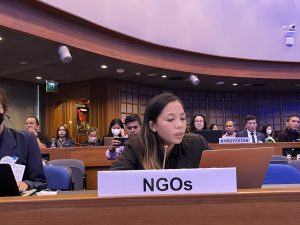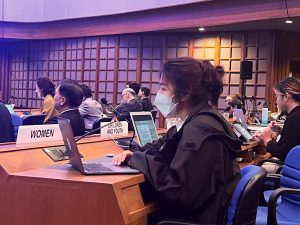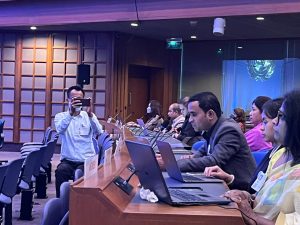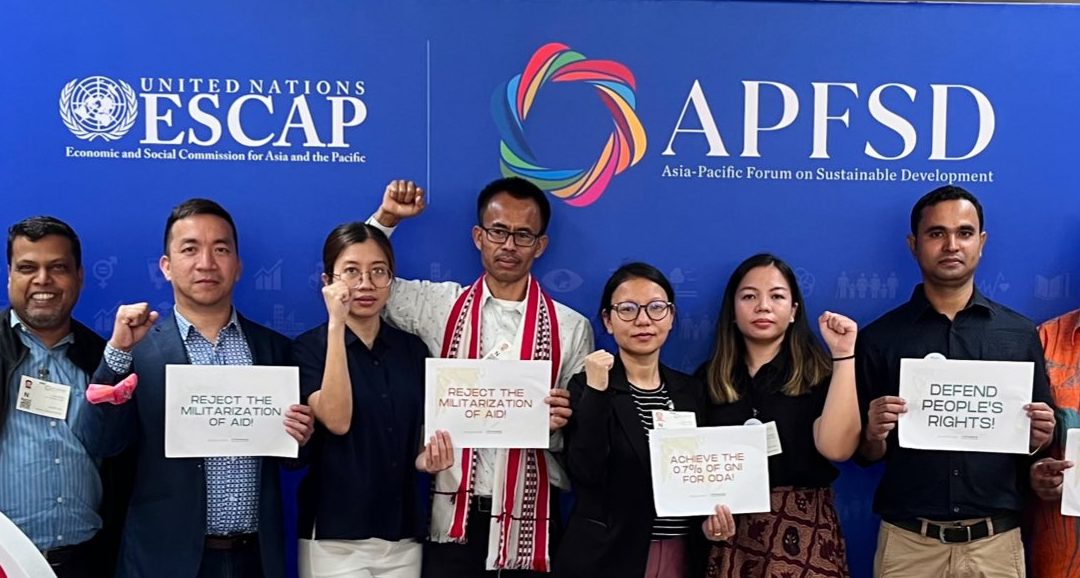In order to move forward with Agenda 2030, the current approach to development that promotes profit over positive development outcomes, enables corporate capture over democratic ownership of development priorities and puts the marginalized further at risk, must be transformed… This entails addressing systemic barriers and forwarding a development justice framework that forwards a people-centered, rights-based and climate-resilient approach for genuine, inclusive sustainable development.
The United Nations Economic and Social Commission for Asia and the Pacific (UNESCAP) organized the 10th Asia-Pacific Forum on Sustainable Development (APFSD) to assess the progress of the region in achieving the Sustainable Development Goals (SDGs), at the mid-point of Agenda 2030 last March 27 to 30 in Bangkok, Thailand. This year’s APFSD has the theme, “Accelerating the recovery from the coronavirus disease (COVID-19) and the full implementation of the 2030 Agenda for Sustainable Development at all levels in Asia and the Pacific”.
Data from UNESCAP declares that the region has only progressed by 14.4 percent towards Agenda 2030 and would entail 42 more years to achieve the goals. There has also been uneven progress in the SDGs, with the regression and stagnation of some goals. As Jiten Yumnam of the Centre for Research and Advocacy, Manipur (CRAM) said in his intervention, “we are halfway towards the deadline of achieving the 2030 Agenda, but it is more and more apparent that we are not only years but decades behind in achieving these goals.”
Despite these figures and realities on the ground, discussions during the APFSD has failed to tackle these five crucial points:
Systemic perspective on the ‘polycrisis’
A significant part of the APFSD tackled the interlinkages and solutions for the food, finance and energy nexus or the ‘polycrisis’. According to UNESCAP, the Asian Development Bank (ADB) and the United Nations Development Programme (UNDP) in their SDG Partnership Report, the polycrisis is a product of the pandemic, Russia-Ukraine conflict, the climate crisis and structural weaknesses. While these have contributed to worsening of these crises, this perspective fails to acknowledge the structural causes behind these multiplying crises.

Tala Batangan from RoA-AP intervening during the 10th APFSD
Tala Batangan of Reality of Aid-Asia Pacific (RoA-AP) encapsulated these barriers in her intervention, “In Asia Pacific alone, 25 countries are exposed to the food, energy and debt crisis, as they are subjected to onerous loans from international finance institutions, with accompanied policy conditionalities that impose austerity measures, promote privatization of essential goods and services and further liberalization of trade and agriculture.”
Without the recognition of these structural barriers, solutions provided by development actors will not adequately address the multi-dimensional crises the region faces. The report promotes innovation as a solution – innovative financing modalities in the form of thematic bonds, technological innovations for energy and food systems, ADB’s energy transition mechanism – which prioritizes profit over genuine inclusive and sustainable development.
Corporate capture in the name of multistakeholderism
With innovative and market-based solutions being given prominence in addressing these crises, this awards a larger role to the private sector in development processes. Food and energy systems have been captured by large multinational corporations, depriving people of nutrition and electricity. Multilateral spaces have allowed for greater corporate intervention, allowing them to influence policies and exploit development interventions for profit. Development financing has been increasingly coursed through international finance institutions (IFIs) in the region, mostly through loans and big-ticket infrastructure projects, contributing to debt distress and adverse impacts on the marginalized and the environment.
IFIs have also pursued policy conditionalities and austerity measures that have led to the privatization of social services and goods urgently needed by the marginalized. Donor countries have also failed to meet their historical 0.7% Gross National Income (GNI) commitment for Official Development Assistance (ODA), in addition to utilizing aid flows to serve their interests. Gene Rodriguez of the Ecumenical Institute for Labor Education and Research (EILER) highlights how “we see drastic cuts in funding public services in favor of infrastructure, military expenses and debt servicing leading to severe impacts on education, health, and basic social services spending.”

Gene Rodriguez from EILER intervening during the 10th APFSD
With this, the stress on private sector financing also allows donor countries and other development actors to abandon their historical commitments in providing much-needed assistance to the region’s marginalized. Multilateralism has failed to alleviate the impacts of emergencies and crises on the marginalized, with SDG 17 having the least progress among the goals in the region.
Solidarity at the center of development cooperation
Recognizing that regional and global cooperation is crucial in progressing towards Agenda 2030, discussions during the APFSD revived frameworks like the South-South Cooperation (SSC) and Triangular Cooperation (TrC). SSC has been purported to support the Voluntary National Reviews (VNRs) through the Twinning Programme, an initiative for peer learning among countries for best practices and modalities. SSC and TrC have also been advanced to mobilize additional financing for the SDGs.
While initiatives surrounding SSC and TrC enable partnerships and cooperation among countries in the global South, these must be strongly grounded on the principles of national sovereignty, national ownership and independence, equality, non-conditionality and non-interference. These approaches must not replace and replicate North-South cooperation, but forward horizontal development cooperation based on the principles of solidarity, mutuality and human rights.
Recovery at all levels means highlighting the role of local actors and realities on ground
During the APFSD, national progress on the SDGs was presented by governments through their VNRs. Largely state-led, VNRs have been often criticized for not capturing the realities on ground as civil society organizations, people’s organizations and communities are not included in these processes. CSOs and communities also experience the shrinking of civic space, with authoritarian regimes pursuing anti-people policies and multilateral institutions giving preferential treatment to corporate bodies. With these, regional SDG progress reports and national reviews are not able to genuinely encapsulate the state of Agenda 2030.
Josaia Tokoni of the Fiji Council for Social Services (FCOSS) asserts that “communities and people need to take ownership of the processes. Indicators and targets are to be redefined and contextualised and localised. Localisation includes the recognition of local leadership, systems and structures. It also includes the recognition of indigenous knowledge, local practices and experience in the implementation of the 2030 Agenda.”

Tirtha Prasad Saikia from NEADS intervening during the 10th APFSD
Tirtha Prasad Saikia of the North-East Affected Areas Development Society (NEADS) also speaks on the importance of localization, “Local communities need to be consulted, and included in the process, with dignity, for control over resources and a better community-led response.”
Transformation of the prevailing development paradigm
The lack of progress towards Agenda 2030 speaks volumes about the failure of the prevailing development paradigm to address the needs of the marginalized and to pursue sustainable development. From the Asia-Pacific Peoples’ Forum on Sustainable Development, CSOs have noted that “fractured multilateralism, profit-driven neoliberal framework, asymmetry in global power relations, hegemony of imperialist countries, their devices and patterns, domination of behemoth corporations, aid and trade rules benefitting the global North, and diversion between sustainable development and respect to human rights fuelling persistent inequities have been the fundamental structural flaws in our weak global governance.”
In order to move forward with Agenda 2030, the current approach to development that promotes profit over positive development outcomes, enables corporate capture over democratic ownership of development priorities and puts the marginalized further at risk, must be transformed. With these, Asia-Pacific peoples’ demands of changing the system and shifting the power must be brought to the 2023 SDG Summit. This entails addressing systemic barriers and forwarding a development justice framework that forwards a people-centered, rights-based and climate-resilient approach for genuine, inclusive sustainable development.

